Archives
-

From here to there: cultural dynamics and contemporary processes
No. 1 (2018)The present issue features articles developed from papers delivered at the doctoral conference held in October 2018 at Sofia University. The chosen theme of the forum, “Here and There – Cultural Dynamics and Contemporary Processes,” was selected with the intention of encouraging participation from as many doctoral students as possible across various faculties, universities, and research institutes, offering them a platform to present aspects of their ongoing dissertation work.
In recent years, the Ethnology program at Sofia University has proudly fostered a talented generation of doctoral students who are exploring increasingly diverse and engaging research topics. On the one hand, some articles reaffirm established areas within ethnology—for example, Bozhidar Parvanov’s work on the semantics of ritual spaces. On the other hand, a growing number of studies reflect new research directions, such as labor mutual aid during socialism (Kristina Bobeva), contemporary migration culture (Marina Ivanova), social capital (Ivanka Abadjieva), and the emergence of new community gatherings and present-day attitudes toward traditional Bulgarian folk dress (Anelia Milusheva).
Undergraduate students from the Ethnology program are also represented in the volume. Valencia Valentinova contributes her perspective on European identity, while Maria Boeklieva—who, after completing her BA in Ethnology, continued her academic path in another faculty—retains her interest in contemporary cultural realities, exemplified in her article on Korean cyber-shamanism.
This collection reflects the breadth and depth of current ethnological research and the vibrant scholarly curiosity of emerging academics.
-

A close look
No. 2 (2018)The articles in the current issue of the "Terrains" journal present research by established scholars, researchers at the beginning of their careers, as well as reports from the latest forum for student and doctoral readings, organized by the Department of Ethnology at Sofia University "St. Kliment Ohridski." We are happy that we did not allow the COVID-19 pandemic to interrupt our decades-long tradition, and we managed to hold the conference in the autumn of 2020. We thank all participants (in the hall and online) for their enthusiasm and support of our efforts to organize regular meetings and exchange ideas, experience, and future opportunities for collaboration among young researchers in the fields of ethnology, anthropology, folklore studies, and history from across the country. A valuable aspect of these meetings is the inclusion of established scholars with many years of experience, who share their knowledge with future researchers. We thank Assoc. Prof. Dr. Iva Kyurkchieva (IEFEM-BAS) for presenting part of her work in the field of the ethnology of sport – a typically interdisciplinary field in which contemporary ethnology finds its place and which is indicative of the variety of topics attracting scientific interest today.
-
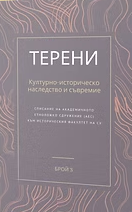
Cultural and Historical Heritage and Contemporary Times
No. 3 (2018)This special issue of Terrains is the result of the international academic conference for student and doctoral readings, organized by the Department of Ethnology and held from June 10 to 12, 2016, in Gyolechitsa. This regularly held forum is not only a platform for thought-provoking presentations, but also a valuable opportunity for meetings and exchange among students and PhD candidates from various Bulgarian and international universities. It offers a space for discussing projects and academic interests, many of which often evolve into shared endeavors, fostering collegial collaboration, a sense of community, friendships, and the birth of new ideas.
The following pages present articles on a variety of topics—some rooted in tradition, others boldly contemporary—but all engaging, inquisitive, and demonstrating knowledge, hard work, and a strong desire for academic growth. The pandemic and the associated restrictions have made us even more aware of the value of in-person interaction that such forums provide. These gatherings are immensely beneficial for young scholars, often marking the beginning of long-term intellectual partnerships. They are also important for colleagues in the middle of their academic careers—not only because they offer a chance to reconnect with the enthusiasm of early steps, but also because the fresh perspective of young researchers often brings with it new approaches and topics that may have previously gone unnoticed or underexplored.
The language of the presentations—and at times the articles themselves—was innovative, offering us a glimpse into the emerging paradigms of academic communication among the next generation of Bulgarian scholars. Personally, I am grateful to have witnessed such a pivotal moment in the transition between academic generations, and I remain optimistic that the scholarship they offer is and will continue to be of the highest quality. The fields of study are far from exhausted, the horizons ahead are vast, and as for the peaks—they will be conquered.
I would therefore like to thank all our colleagues for the inspiration and sense of fulfillment they brought to the conference, and I hope the papers included in this issue will evoke the same feeling in its readers.
-
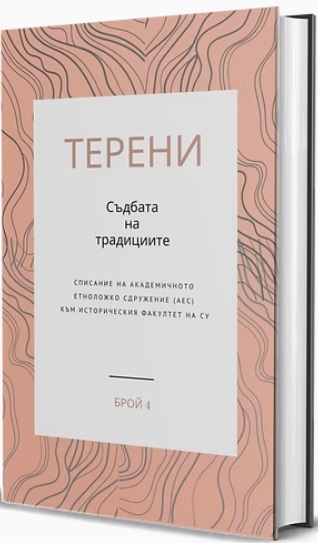
The fate of traditions
No. 4 (2019)The present issue of Terrains features articles developed from papers presented at the international academic conference The Fate of Traditions, organized by the Department of Ethnology at Sofia University “St. Kliment Ohridski” and held from November 16 to 18, 2018, in the town of Kyustendil.
Due to the heavy workload of the university publishing house, the planned print edition proved difficult to realize. However, we hope that the online publication will reach a wider readership, thus compensating for the long delay.
It is important to note that the texts are presented as they were submitted for print in early 2019; therefore, some more recent publications may be missing from the cited references.
-
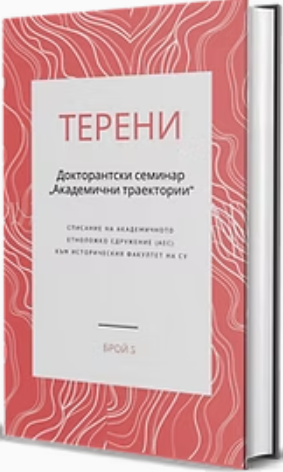
Doctoral Seminar "Academic Trajectories"
No. 5 (2021)The articles in the present Issue 5 of Terrains are based on the papers developed for the doctoral conference “Doctoral Seminar: Academic Trajectories,” held in 2021. The event was organized by the Department of Ethnology at the Faculty of History, Sofia University “St. Kliment Ohridski,” and took place at the Rodopi Center in the village of Slaveyno, Smolyan Municipality, from September 9 to 11, 2021.
Despite the ongoing challenges of the COVID-19 pandemic, the Department of Ethnology succeeded in upholding its long-standing tradition of organizing this important doctoral forum. It provided an opportunity for young scholars working in the academic fields of ethnology, cultural anthropology, and social history to present their research at an intermediate stage. The doctoral conference once again served as a valuable platform for both direct and mediated interaction between doctoral students and faculty members from various universities and research institutes.
The articles in this issue are diverse and engaging. Alongside established themes from classical fields of ethnology, the volume includes contributions addressing contemporary anthropological topics, as well as intersections between ethnology, history, and education. This issue of Terrains clearly illustrates the emerging directions and expanding horizons in the work of young researchers.
We extend our gratitude to all participants in the academic forum for their original presentations, stimulating discussions, and dedicated efforts in preparing the articles featured in this volume, which readers now have the opportunity to explore.
-
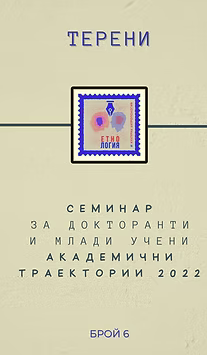
Doctoral Seminar "Academic Trajectories"
No. 6 (2022)Issue 6 of Terrains presents papers from the "Seminar for Doctoral Students and Young Scholars: Academic Trajectories," held from September 16 to 19, 2022, at the Rodopi Center in the village of Slaveyno, Smolyan Municipality. The event was organized by the Department of Ethnology at the Faculty of History, Sofia University “St. Kliment Ohridski.”
Once again, young scholars working in the fields of the human and social sciences demonstrated a broad spectrum of interests and directions through their academic research, reaffirming the importance of regularly holding such forums. These gatherings provide valuable opportunities for exchange, discussion, and personal contact among colleagues from different disciplines and institutions, both in Bulgaria and abroad.
The articles featured on the following pages represent a selection of the studies presented at the seminar and cover a variety of topics.
-
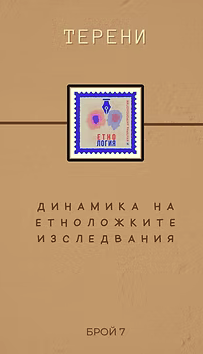
The Dynamics of Ethnological Research
No. 7 (2023)The present Issue 7 of Terrains serves as a form of recompense to the authors whose articles were originally intended for publication in Ethnologia Academica, Volume 12—an edition that, unfortunately, never materialized in print.
This volume of Ethnologia Academica continues the long-standing tradition of the Department of Ethnology at Sofia University “St. Kliment Ohridski” in organizing national ethnological conferences. These events bring together undergraduate, master’s, and doctoral students from various programs at Sofia University and other institutions engaged in related research. In doing so, the Department of Ethnology provides a valuable platform for young researchers in the fields of ethnology, cultural studies, sociology, history, and other humanities to share their academic interests with peers.
The present collection includes articles addressing a wide array of topics in ethnology, sociology, and history, highlighting both the dynamism and the diverse potential of contemporary ethnological research. The studies explore a range of issues—from transformations in tradition in contemporary contexts, to urban space, coexistence between communities, and urban culture and festivity. Topics such as social inequality, foster care, and current migration processes are also among the focal points of scholarly interest.
The texts in this volume stem from two National Ethnological Conferences: the National Student Ethnological Conference held in Gabrovo – Etar in 2015, and the Student and Doctoral Readings held in Pamporovo in 2017. Both events were organized by the Department of Ethnology at Sofia University “St. Kliment Ohridski” and co-financed by the Student Council. The issue features contributions from participants representing various academic and research institutions across the country, including Sofia University, Plovdiv University “Paisii Hilendarski,” Veliko Tarnovo University “Sts. Cyril and Methodius,” and the Institute of Ethnology and Folklore Studies with Ethnographic Museum at the Bulgarian Academy of Sciences.
-
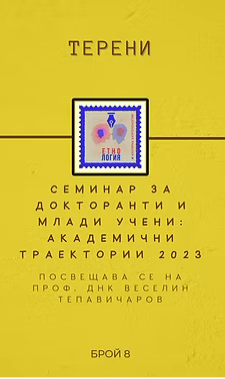
Seminar for Doctoral Students and Young Scholars: Academic Trajectories Dedicated to Prof. DSc Veselin Tepavicharov September 1–4, 2023 Rodopi Center, Slaveyno village, Smolyan Region
No. 8 (2024)Issue 8 of Terrains presents selected papers from the "Seminar for Doctoral Students and Young Scholars: Academic Trajectories. Dedicated to Prof. DSc Veselin Tepavicharov," held from September 1 to 4, 2023, at the Rodopi Center in the village of Slaveyno, Smolyan Municipality (with an online option). The event was organized by the Department of Ethnology at the Faculty of History, Sofia University “St. Kliment Ohridski” and was carried out with the support of the Sofia University Research Fund (contract № 80-10-77/25.04.2023).
Thanks to the now well-established hybrid format, the seminar brought together researchers from 13 different academic and scientific institutions from Bulgaria and abroad, working in the fields of ethnology, cultural anthropology, history, education, psychology, social work, museum studies, and more. The presented papers demonstrated a wide range of interests and approaches, sparking interdisciplinary discussions that we consider especially fruitful. We believe that the future of science lies in transcending traditionally defined boundaries and fostering collaboration.
We thank all participants, and on the following pages, we present a selection of their research.
-
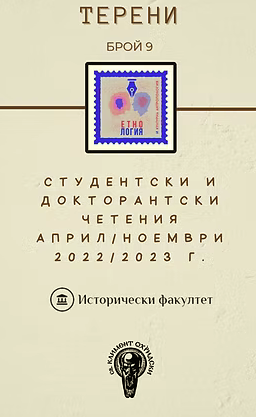
Student and Doctoral Academic Readings April/November 2022/2023 Conference
No. 9 (2024)Issue 9 of Terrains is dedicated to the youngest members of the academic community. The following pages feature papers presented at two consecutive forums – the Student and Doctoral Academic Readings – traditionally organized by the Faculty of History at Sofia University “St. Kliment Ohridski” in 2022 and 2023 (the April and November Readings). The volume is introduced by Prof. Dr. Nadya Manolova-Nikolova.
-

Seminar for Doctoral Students and Young Scholars: Academic Trajectories Dedicated to Prof. DSc Veselin Tepavicharov September 11–14, 2024 Rodopi Center, Slaveyno village, Smolyan Region
No. 10 (2025)Issue 10 of Terrains journal presents papers from the "Seminar for Doctoral Students and Young Scholars: Academic Trajectories," held from September 11 to 14, 2024, at the Rodopi Center in the village of Slaveyno, Smolyan Municipality. The event was organized by the Department of Ethnology at the Faculty of History, Sofia University “St. Kliment Ohridski.” This already established annual forum once again demonstrated the importance of opportunities for mutual exchange, of meetings beyond academic institutions, and of the sharing and discussion of ideas both inside and outside the formal conference setting. Young colleagues working in the fields of human and social sciences once again showcased a wide range of interests and directions, presenting their research and facilitating personal connections among scholars from various disciplines and institutions in Bulgaria and abroad. The articles featured on the following pages represent a selection of the studies presented during the seminar and cover diverse topics in the fields of history, education and social work, ethnology, and anthropology. We thank the authors, as well as all participants, for their original ideas, engaging discussions, and enthusiasm!




